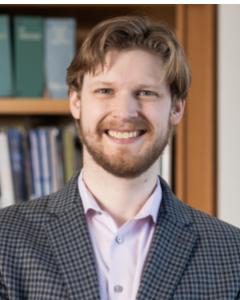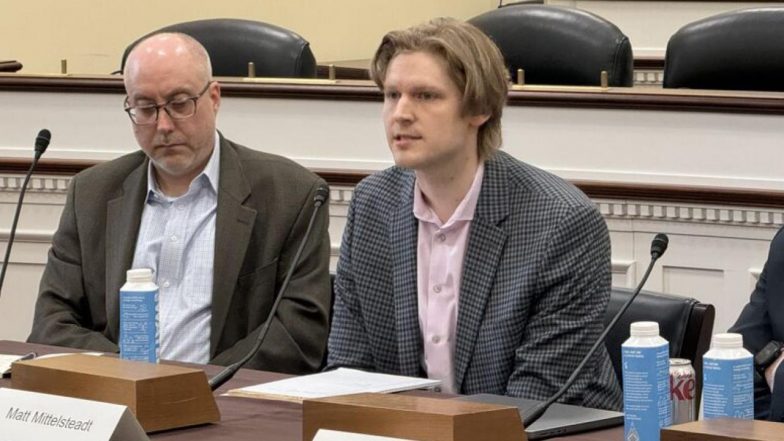Summary
Matthew Mittelsteadt is a technology policy research fellow at the Cato Institute. His research focuses on the intersection of policy, cybersecurity, and emerging technologies including artificial intelligence and quantum computing. Matthew’s work concentrates on ensuring emerging tech adoption and innovation, enabling robust cybersecurity, and preserving tech market access and international trade. His work has appeared in The Hill, National Review, Noema Magazine and his Substack Digital Spirits.
Prior to joining Cato, Matthew worked as an AI policy fellow at both the Mercatus Center at George Mason University and Syracuse Law School. In the private sector, he developed his tech expertise as a healthcare IT professional. He holds a BA in economics and Russian Studies from St. Olaf College, an MPA from Syracuse University, and an MS in cybersecurity from New York University.
Competitive Enterprise Institute – 08/02/2024 (33:44)
February 8th, 2024 – This week we cover Elon Musk’s controversial pay package, protecting children online, and the Biden administration’s slamming the breaks on new natural gas projects. Our interview this week is with Matt Mittelsteadt, a research fellow at the Mercatus Center at George Mason University.
We talk about artificial intelligence computing applications, what you can do with them, and how the government wants to regulate them. Free the Economy is produced and hosted by Richard Morrison and edited and co-produced by Ryan Kracinski.
OnAir Post: Matthew Mittelsteadt
News
Digital Spritis, – July 21, 2025
Perhaps the biggest near-term AI opportunity is reducing cybercrime costs. With serious attacks unfolding almost daily, digital insecurity’s economic weight has truly grown out of control. Per the European Commission, global cybercrime costs in 2020 were estimated at 5.5 trillion euros (around $6.43 trillion). Since then, costs have only spiraled. In 2025, Cybersecurity Ventures estimates annual costs will hit $10 trillion, a showstopping 9 percent of global GDP. As Bloomberg notes, global cybercrime is now the world’s third-largest economy. This is truly an unrivaled crisis.
Thankfully, it is also an unrivaled opportunity. Given the problem’s sheer scale, any technology, process, or policy that shaves off just a sliver of these cyber costs has percentage point growth potential. Reduce cyber threats, and abundance will follow.
To seize the opportunity, our single best hope is AI. There’s no question human engineers have failed to contain this cost crisis. As threats rapidly proliferate, human labor has remained profoundly limited. Thankfully, a truly promising set of AI technologies is emerging to not only manage the challenge but also significantly reduce total costs. If we play our cards right—and make prudent policy choices—substantial economic possibilities are ours to seize.
By now, most have heard of Deepseek, the Chinese startup whose namesake AI model surprised the American tech sector with state-of-the-art capabilities delivered at a fraction of U.S. costs.
For those in Washington concerned about potential geostrategic risks of China’s rising tech sector, anxiety was swift and predictable. Since Deepseek’s release, some have fretted that the model’s rock bottom prices might undercut the American market. Meanwhile others have voiced valid data security issues. It’s been noted all user conversations are stored in China and that application code enables direct communication to government controlled servers.
Conclusion
Deepseek and other Chinese AI technologies unquestionably merit scrutiny and skepticism given the geopolitical tensions and conflict of values. Still, any catch-all ban would sacrifice not only general freedom of use, but crucial market dynamism, innovation opportunities, and cybersecurity advantages. By pursuing a measured approach that prioritizes informed use, app store curation and when needed, narrowly scoped regulation, the United States can maintain the technological openness key to both security, and global leadership.
Digital Spirits, – January 22, 2025
Can AI agents solve our digital interoperability problem?
At January’s Consumer Electronics Show, NVIDIA CEO Jensen Huang boldly proclaimed, “the Age of AI agentics is here.” Just days before, OpenAI’s Sam Altman echoed the chipmaker, blogging “We [OpenAI] believe that, in 2025, we may see the first AI agents “join the workforce” and materially change the output of companies.” AI agents are back in vogue.
For the non-technical, “agents” or “agentic AI” refers to AI equipped with not only intelligence, but the ability to autonomously solve complex, multi-step problems. In short, very smart bots.
For years there have been attempts to create workable agents, yet hype has always outpaced reality. Following the release of ChatGPT came a boom of excitement, yielding frameworks like babyAGI, which were unreliable and used tech that failed often. Today, products, such as Salesforce’s Agentforce and Google’s Agentspace, offer modest improvements enabling agents to field customer service queries and automate business tasks. Still, they only work in highly structured environments and are limited to preapproved tasks.
About
Bio
 Technology Policy Research Fellow
Technology Policy Research Fellow
Full-timeCato Institute
Feb 2025 – Present · 2 mos · 2 mosWashington, District of Columbia, United States · On-siteWashington, District of Columbia, United States ·
On-site: Researching a liberal approach to AI and cybersecurity policy.
Research Fellow Mercatus Center at George Mason University
Full-time Mercatus Center at George Mason University · Full-timeJun 2022 – Present
Scholar for Mercatus’ AI Progress Project
Concentrating on trade, cybersecurity, and the rapid yet responsible diffusion of AI technology.Scholar for Mercatus’ AI Progress Project. Concentrating on trade, cybersecurity, and the rapid yet responsible diffusion of AI technology.
Source: LInkedIn
Web Links
Videos
Understanding AI with Matthew Mittelsteadt
(33:44)
By: Competitive Enterprise Institute
February 8th, 2024 – This week we cover Elon Musk’s controversial pay package, protecting children online, and the Biden administration’s slamming the breaks on new natural gas projects. Our interview this week is with Matt Mittelsteadt, a research fellow at the Mercatus Center at George Mason University.
We talk about artificial intelligence computing applications, what you can do with them, and how the government wants to regulate them. Free the Economy is produced and hosted by Richard Morrison and edited and co-produced by Ryan Kracinski.


